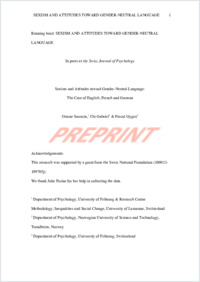Sexism and Attitudes toward Gender-Neutral Language : The Case of English, French and German.
- Sarrasin, Oriane University of Fribourg
- Gabriel, Ute Norwegian University of Science and Technology,
- Trondheim, Norway
- Gygax, Pascal University of Fribourg
-
2012
English
We examined the relationships between three forms of sexism (Modern, Benevolent and Hostile) and two components of attitudes toward gender-neutral language (attitudes toward gender-related language reforms and recognition of sexist language) across different contexts. A questionnaire study (N = 446) was conducted among students in the United Kingdom and in two regions (French- and German-speaking) of Switzerland. While we generally hypothesized all forms of sexism to be related to negative attitudes toward gender-neutral language, attitudes were expected to be more positive and less related to sexist beliefs in a context where gender-neutral language is firmly established (the UK), compared to contexts where the use of such language is only recent (the German-speaking part of Switzerland) or still scarce (the Frenchspeaking part of Switzerland). We found that across all contexts modern and hostile sexist beliefs were indeed related to negative attitudes toward gender-related language reforms while, intriguingly, benevolent sexist beliefs were related to positive attitudes in the French-speaking part of Switzerland. Recognition of sexist language was significantly related to Modern Sexism only. Finally, British students were found to express more positive attitudes toward gender-neutral language (both components) than Swiss students.
- Faculty
- Faculté des lettres et des sciences humaines
- Department
- Département de Psychologie
- Language
-
- English
- Classification
- Psychology
- License
- License undefined
- Identifiers
-
- RERO DOC 209006
- Persistent URL
- https://folia.unifr.ch/unifr/documents/303312
Statistics
Document views: 131
File downloads:
- SarrasinGabrielGygax_2012_preprint.pdf: 1127
